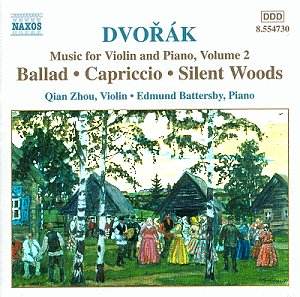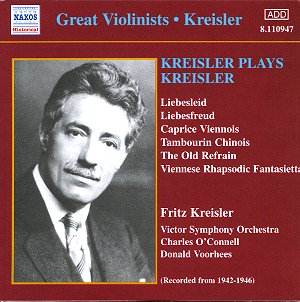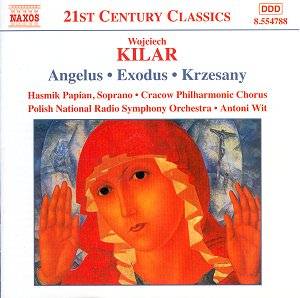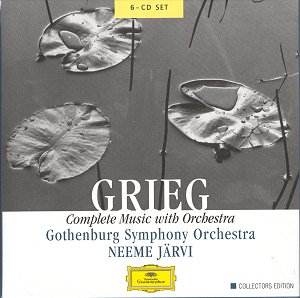 Composer: Antonín Dvořák
Composer: Antonín Dvořák
Works: Ballade in D minor, Op. 15, No. 1; Slavonic Dance in G minor, Op. 46, No. 2 (arr. Kreisler); Slavonic Dance in E minor, Op. 72, No. 10 (arr. Kreisler); Slavonic Dance in G major, Op. 72, No. 16 (arr. Kreisler); Silent Woods, Op. 68, No. 5; Mazurek in E minor, Op. 49; Nocturne in B major, Op. 40; Humoresque, Op. 101, No. 7; Songs my mother taught me, Op. 55, No. 4 (arr. Kreisler); Capriccio (Rondo di Concerto), B 81; Reverie, Op. 85, No. 6 (arr. Paul Klengel)
Performers: Qian Zhou (violin), Edmund Battersby (piano)
Recording: Recorded at Potton Hall, Suffolk, May 1999
Label: NAXOS
Dvořák’s chamber works for violin and piano occupy a valuable niche in the classical repertoire, blending lyrical beauty with rhythmic vitality. The current collection, featuring Qian Zhou and Edmund Battersby, presents a selection of Dvořák’s lighter pieces, many of which have become beloved encores, showcasing the composer’s ability to craft melodies that resonate deeply while remaining accessible. The historical context of these works, particularly in the late 19th century, reflects the composer’s desire to blend folk elements with classical forms, a hallmark of his style, which is evident in the arrangements by Fritz Kreisler that populate this recording.
Qian Zhou’s interpretation is a mixed bag, balancing moments of profound expressiveness with occasional technical inconsistencies. For instance, her reading of the Humoresque, arguably one of Dvořák’s most recognized themes, exhibits a charming whimsy that is diminished by her overly free portamento. This stylistic choice, while reminiscent of earlier violinists, results in a disjointed phrasing, making the melodic line feel fragmented rather than fluid. In contrast, her performance of the melancholic Ballade in D minor reveals a more assured grasp of the piece’s lyrical demands. Here, both Zhou and Battersby deliver a compelling interplay, particularly in the central section’s dramatic contrasts, where Battersby’s piano work shines with clarity and purpose.
The Slavonic Dances, arranged by Kreisler, are delightfully rendered, capturing the infectious rhythms and vibrant colors that characterize Dvořák’s music. The arrangement of the G minor dance, for example, benefits from Battersby’s lively accompaniment, which complements Zhou’s spirited playing beautifully. The recording quality is commendable, providing a well-balanced sound that allows the violin and piano to interact seamlessly without one overpowering the other. The engineering captures the subtleties of both instruments, ensuring that the listener can appreciate the nuances of their dialogue.
The Capriccio, while not as frequently performed, stands out in this collection for its dynamic range and compositional depth. Zhou and Battersby navigate its contrasting sections with evident joy, presenting a vibrant interpretation that belies its designation as an ‘encore’ piece. This performance, particularly, challenges Keith Anderson’s assertion of its lack of distinctiveness, revealing instead echoes of Dvořák’s broader oeuvre, including thematic links to the Sixth Symphony.
This recording, while perhaps not exhaustive in its selection, serves as a delightful reminder of Dvořák’s gift for melody. Zhou and Battersby’s partnership is marked by enthusiasm and a palpable sense of enjoyment, which translates into an engaging listening experience. The balance of familiarity and freshness in these interpretations makes the album a worthy addition to the catalog of Dvořák’s chamber music. For those seeking a cheerful and light-hearted exploration of his work, this disc delivers with charm and substance.



